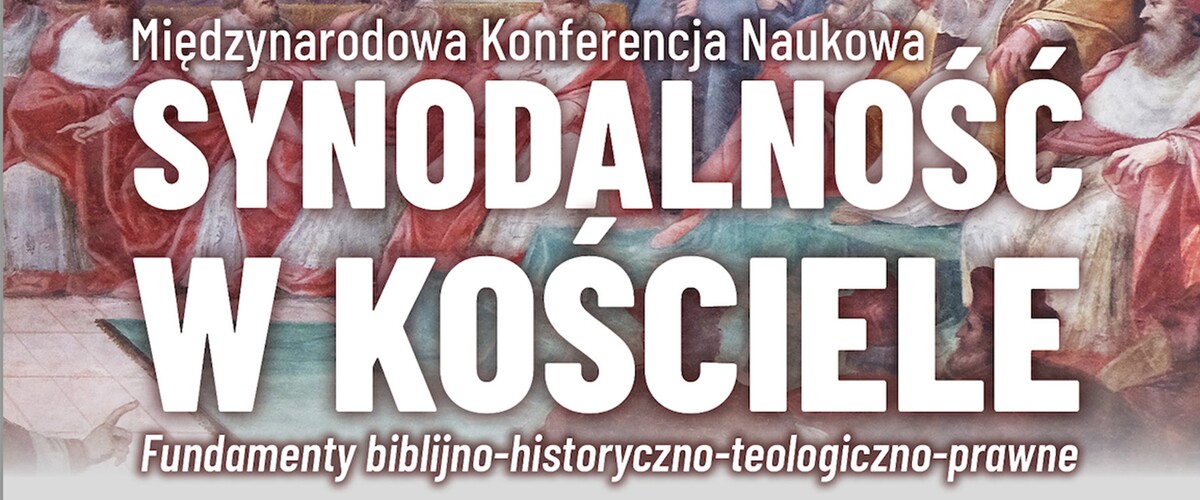
The Chair of Catholic Theology of the University of Białystok, in view of the contemporary socio-cultural circumstances of life and Pope Francis' extensive program of renewal of the Church initiated at the opening of the 16th General Assembly of the Synod of Bishops on October 9, 2021 in Rome, and on October 17 of the same year in all dioceses of the world under the motto: "Towards a Synodal Church: communion, participation and mission", invites all interested parties to the international conference: Synodality in the Church. Biblical, historical, theological, and legal foundations.
November 16, 2024 in Białystok, Poland (Centrum Wystawienniczo-Konferencyjnego w Białymstoku).
The Church, taking into account the conditions of the changing socio-cultural reality, has the obligation to „examine the signs of the times and explain them in the light of the Gospel, so that it can answer people’s eternal questions about the meaning of present and future life and their mutual relationship to each other in a way adapted to the mentality of each generation” (GS 4).
In view of the contemporary socio-cultural circumstances of life and Pope Francis' extensive program of renewal of the Church initiated at the opening of the 16th General Assembly of the Synod of Bishops on October 9, 2021 in Rome, and on October 17 of the same year in all dioceses of the world under the motto: „Towards a Synodal Church: communion, participation and mission”, the Chair of Catholic Theology of the University of Białystok invites all interested parties to the international conference: Synodality in the Church. Biblical, historical, theological, and legal foundations.
Synodality refers to a wide-ranging program of renewal of the life of faith in the Church. The conference aims to present the main assumptions of synodality originating in the nature of the Church from a biblical, historical, theological, and legal perspective.
The concept of synodality entails a more communitarian way of functioning of the Church and of taking decisions within it – as known from the period of Christian antiquity – based on internal dialogue, greater openness to lay people and their more responsible participation. In the synodal process, the Church as a community should discover its roots in order to open itself to the inspiration of the Holy Spirit and focus on a dynamic life of faith, taking into account the new „signs of the times”.
Ives Congar, a famous theologian of the Second Vatican Council, put it this way: „The first millennium belonged to the Church of communion, where the experience of synodality was very alive. In the second millennium, also for historical reasons, the Church placed greater emphasis on hierarchy”. This was associated, on the one hand, with the Church’s entry into feudal structures, as well as the development in the Western Church of so-called Roman centralism, which started with the Gregorian reforms.
A deep separation between the hierarchy and the rest of the faithful took place at the Council of Trent (1545–1563), which was a response to the Reformation, which itself applied a radical understanding of the principle of synodality, by introducing democratic principles of governance and abolishing sacramental priesthood. The reform of the Church then moved towards a division into „Ecclesia docens”, i.e. a teaching Church composed of bishops with the Pope at the head, and the rest of the People of God, which was described as „Ecclesia discens”, i.e. a listening Church.
The Tridentine vision of the Catholic Church dominated its life for the next few centuries. A significant change was brought about by the Second Vatican Council, which – trying to return to evangelical sources – defined the Church in a much more complete way. A strong emphasis was placed on two concepts: „Communio” (Community) and the People of God. The Church, as communio recalls the communion of man with God and of men among themselves, which is realized in Christ. The Church is therefore a community advancing towards an ever more perfect unity in the Holy Spirit, to which the mission of salvation of the entire human race is entrusted.
Following this, the Vatican Council invoked the equal dignity of all those who are baptized and the universal call to holiness and emphasized the participation of all the faithful in the priestly, prophetic, and kingly mission of Jesus Christ. This implies an idea of a universal priesthood (not only priesthood by ordination), including the participation of lay people in this universal priesthood.
Synodal structures were introduced following the Second Vatican Council. In 1968, Paul VI established the Synod of Bishops as an advisory body to the Pope. In turn, a new form of synodal assemblies was introduced in local Churches, not only in the form of meetings of bishops and clergy to establish the law, but also with the participation of the laity and with a much broader pastoral reflection. The famous „Synod of Krakow” initiated by the then Archbishop Karol Wojtyła was an example of such a type of synod, as was subsequently the Second Polish Plenary Synod and numerous diocesan synods.
The concept of synodality is embodied to an even greater extent in the life of the Church today. It is a principle that is understood as making the Church much more „communio” – a community in which everyone has a greater sense of participation, which in turn is to make the Church much better able to fulfil her mission in the modern world.
Synodality is not something new in the Church; on the contrary, it goes back to the origins of its foundation. In the first millennium, „walking together”, that is, practicing synodality, was the usual way of functioning of the Church understood as „a people united by the unity of the Father, the Son, and the Holy Spirit”. St. John Chrysostom could say: “The Church and the Synod are synonymous.” Even in the second millennium, when the Church placed greater emphasis on the hierarchy this manner of acting was not lacking.
In order to better understand the roots of synodality and analyse some stages in its history, the conference is meant to support the study of its development from the past, based on biblical-historical-theological-legal foundations.
„It is the path of synodality that is the path that God expects from the Church of the third millennium”: this programmatic commitment was proposed by Pope Francis on the occasion of commemorating the fiftieth anniversary of the establishment of the Synod of Bishops by Blessed Paul VI. Synodality, the Pope emphasized, is „a constitutive dimension of the Church”, therefore „What the Lord asks of us is in a sense already fully contained in the word synod”. The Holy Father invited the entire Church, the entire People of God, that is, all the baptized, regardless of their condition, environment, regardless of their level of moral life, their current commitment to the life of the Church. By virtue of holy baptism, all are responsible for the Church, for its shape, mission, fruitfulness of its action, and the extent to which the Church is what and as Jesus wanted it to be. Therefore, we are all responsible for the extent to which our Church is „like a sacrament of salvation”, that is, a „visible sign of invisible grace”. So, everyone is invited to participate in the synodality of the Church, the key to which is, in addition to the word „path”, is „meeting”, „listening”, „discernment”.
From the beginning of its existence, the Church was guided by the principle of synodality, although in the first centuries the Apostles participated in it, and later bishops, priests and the people. In the Church, all the baptized are guided by a „sense of faith”. In the pilgrimage of the Church since its inception, synodality has been strengthened by listening and talking to each other, to better know where the Holy Spirit wants to lead.
We invite all who are interested to participate in the conference to understand – through the substantive content delivered by the speakers – that the Church, as a synodal one, is more authentic and can experience a chance for inner renewal, necessary to continue its mission in the modern world and in an increasingly unfavourable cultural environment.
Synodality results from baptismal dignity and consists in the co-responsibility of all the baptized for the Church, appreciates the value of the charisms bestowed by the Holy Spirit on the People of God, recognizes the ministry of pastors in collegial and hierarchical communion with the Bishop of Rome, who ensure that synodal events follow depositum fidei and obedience to the Holy Spirit for the renewal of the Church’s mission. An important condition to be met is the principle of cooperation of hierarchical and charismatic gifts.
The aim of the conference „Synodality in the Church” is to refer to historical, theological, biblical, and legal guidelines, useful for the theological deepening of the awareness of synodality in the Church.
Online broadcast, translated into English
The project is funded by state budget resources granted by the Minister of Science and Higher Education as part of the "Doskonała Nauka II" program.

The event is organized in partnership with and with the support of the Podlaskie Voivodeship.
